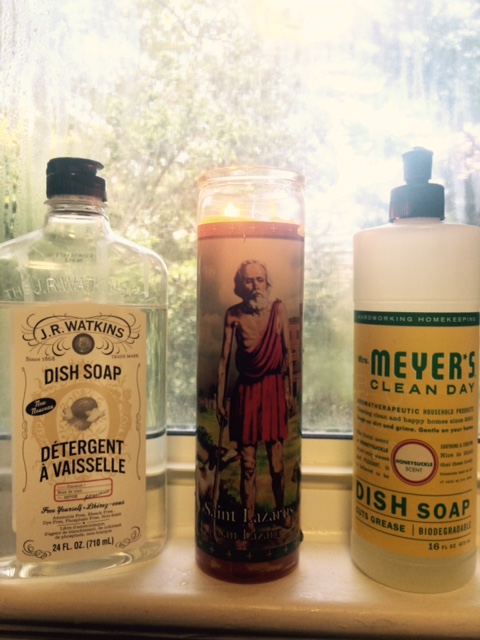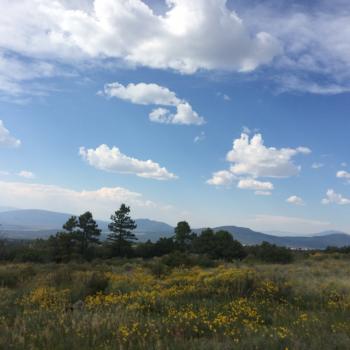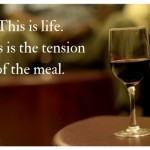
I found a Catholic prayer candle at Goodwill a few afternoons ago.
It hadn’t been lit yet, so all prayers resulting from its wick’s glow would be the first.
On the front, San Lazaro, Saint Lazarus, Saint of the Poor.
I took the candle home and placed it on the kitchen window by the sink, the window overlooking our neighbor’s side yard.
Our new home doesn’t have a dishwasher, so doing dishes isn’t just work, but an event, a challenge to keep the kitchen organized and clean.
So I light the candle and I say hello to Saint Lazarus. I remember the story of his life, the way he and Jesus cared for another like kin.
I can hear the boys arguing in the living room behind me, their voices rising and falling again as they move on, playing together.
I scrub the bowls clean and place them on the dish rack to my right, wondering what it means to be poor, to not be poor, to be poor of spirit, to be poor of heart.
I rinse the knives and forks and spoons and say thanks for what I’ve seen and known in my days, but there is Lazarus, speaking to me with his eyes, reminding me that I am not alone, because my people, my generation, my living– it’s not just mine. It’s a global reality.
In a collection of essays by young Syrians, I remembered what Lazarus’s life meant.
I remember the beggar sitting outside the rich man’s house;
I remember the way we listen to what we want to hear and avoid what we don’t;
I remember our obsession with Mercedes and Frank Lloyd Wright and the iPhone-newest;
we are bombarded with sales racks and celebrity gossip and religious piety;
and it becomes easier and easier to avoid the eyes of Saint Lazarus, his presence and his challenge to never forget the ones who are far away and walk a terrifying path.
“The first full day at Saarbrücken was very hard on me. I had to wait in lines for food and papers. But I had to just deal with it. I am no longer in my house. I am not sitting in my kitchen with my family, waiting for my mother to prepare a nice meal. This is my new temporary life now.” —Hassan Jamous, 24.
And so I grab the towel and begin to dry those extra dishes that couldn’t fit on the dish rack, and I see faces this time, hear names and imagine stories playing over and over again in my mind.
I am a millennial– a western millennial, a Native American millennial, a female, mother, partner, worship leader, writer millennial.
But what do generation gaps mean for the rest of the world? I look at the eyes of Zozan Khaled Musa, 25, and realize that while I sit here and drink my coffee in a coffee shop in Atlanta, she sits in Germany as a refugee, with hopes and dreams for things that are similar to my hopes and my dreams–
a young woman my age who knows wisdom and grace because she has walked so far and so hard to get to where she is today.
Or Rena Khalid Moussa, 29, a year older than me. I see her, too.
Please read their stories.
Light your candle and remember.
To be better world citizens, we remember that we are not the only citizens, and that we belong to a whole creation of others– every generation coming after the one before, every life marked by sweat and tears and the hope for connection.
It is so good to remember what is beautiful, to look around us and bask in thanksgiving, to give ourselves over to gratefulness every single day.
But a practice is demanded of us, one that has existed for centuries and will never die out as long as there is suffering lurking across the earth–
we practice lighting that candle and we practice stepping outside of ourselves and if we’re lucky, we learn to take our children and our friends and our churches and our everything along with us,
and there the world’s borders are broken, and we find that every refugee belongs to us and we to them,
every brokenness is ours,
every poor heart is our poor heart,
every glorious reality is shared between us,
and the eyes and spirit of Saint Lazarus tell us again that the way we are resurrected day after day is by knowing that life exists outside our tombs and broken places, where we find each other at the light of the new morning.











